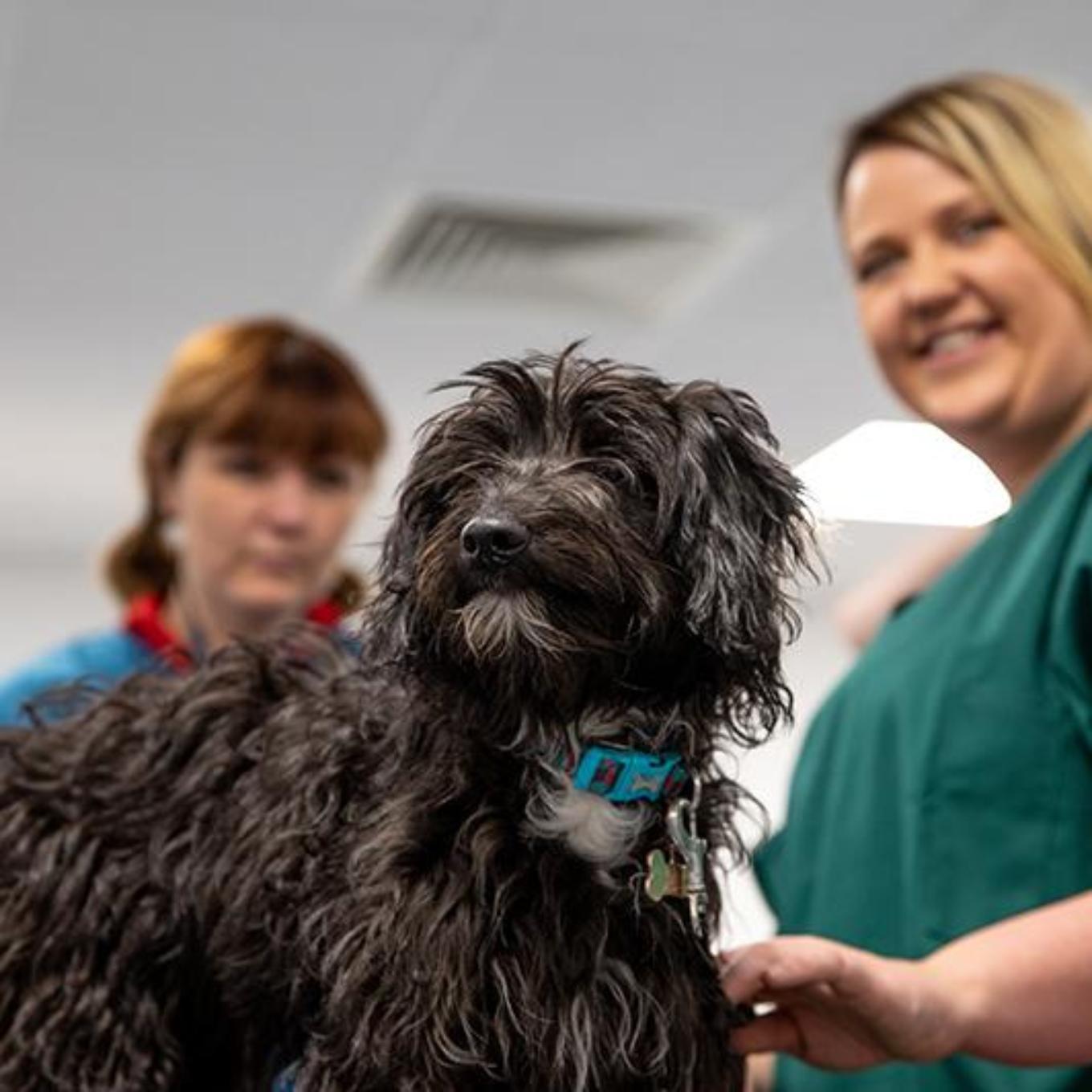FdSc Veterinary Nursing

Course details
UCAS Code
FDVN
Year of entry
2025, 2026
Duration
3 YRS (FT)
UCAS Tariff
48-72
Institution Code
G53
Location
Northop
Course Highlights
Accredited
by the Royal College of Veterinary Surgeons (RCVS)
Access
our fully equipped Veterinary Nursing Clinical Suite
Placements
in a RCVS-approved veterinary practice each year
Why choose this course?
Veterinary Nurses have a key role within the multidisciplinary veterinary team in providing evidence-based nursing care for their patients. If you want to work with companion animals and their owners to improve their wellbeing, and would thrive in an environment that is challenging, varied but immensely rewarding, this is the course for you.
You will:
- Apply theory to practice in our state of the art clinical suite, equipped with a range of veterinary equipment and training manikins
- Develop your clinical skills in a veterinary training practice
- Be mentored in practice by a Clinical Coach during your 16-week placement blocks and be supported by a Clinical Placement Support Tutor from the University Veterinary Nursing Team.
- Become a Registered Veterinary Nurse in line with the RCVS, a recognised and respected profession
- Gain knowledge and skills to pursue advanced certifications and specialities in the field
- Learn from experienced veterinary nurses with industry connections, who will guide you with your studies to ensure that you achieve your professional and personal goals

Key course features
- This course adopts modern, interactive teaching styles, including workshops, case-based learning, and multimedia resources to ensure lectures are engaging and practical
- This course offers regular guest lecturers from within the profession, alongside interdisciplinary collaborations with other human healthcare professionals
- On programme completion, you will be eligible to apply for registration with the Royal College of Veterinary Surgeons (RCVS), enter onto the register of veterinary nurses and use the post nominals RVN
- Small collaborative learning community with staff and students
- This course is fully accredited by the Royal College of Veterinary Surgeons (RCVS)
What you will study
YEAR 1 (LEVEL 4)
In this first year of study, you will develop a range of skills and the underpinning knowledge that are essential for working in the veterinary industry. There are four modules to be studied in the first year of your programme. All modules are core modules.
MODULES
- Anatomy and Physiology in Health and Disease: This module will develop your knowledge and understanding of animal anatomy and physiology at both systems and cellular level. The module will integrate physiology and pathophysiology to develop your understanding of disease states.
- Foundations of Patient Care: A diverse module which introduces you to evidence-based patient care and will cover a wide range of topics and skills, which are essential for the veterinary nurse in practice. You will develop an understanding and set of skills to safely handle and restrain animals for a range of procedures that are required in practice. Modifications that a veterinary nurse can introduce to ensure patients are as comfortable and stress-free as possible in the veterinary environment will be explored with the theory and practice of nursing care plans being central to positive patient outcomes.
- Foundations of Nursing Practice: The module aims to equip you with an understanding of wound management, bandaging techniques and first aid procedures. The importance of fluid therapy in patient treatment and recovery will be covered. Physical therapy will also be covered in this module and the benefits it can have on patient outcomes. Another area that is important for veterinary nurses to be knowledgeable and competent in is veterinary medicines and the legislation and requirements around this topic. An introductory to pharmacology and pharmacodynamics will be covered in this module.
- Professional and Academic Development 1: In this module, you will be introduced to the RCVS Nursing Progress Log (NPL), the RCVS day one competences (DOC) and day one skills (DOS). This module prepares you for your first placement in veterinary practice as well as developing essential skills required for your academic studies, which will be used and extended on throughout the programme.
YEAR 2 (LEVEL 4/5)
Four core modules this year to be studied, two at level 4 and two at level 5. This year’s modules begin to focus on specific and specialist skills that the veterinary nurse will become competent in practice.
MODULES
- Diagnostic Procedures and Parasitology: Diagnostic procedures are essential for a correct patient diagnosis within the veterinary practice. Veterinary nurses routinely assist under the direction of the veterinary surgeon in a range of diagnostic procedures. You will gain an understanding of the principles which will enable you to safely use a range of imaging techniques and laboratory tests. This module will also cover the important topic of parasitology, focusing on identification methods, life cycles and strategies to treat and control them.
- Nursing the Medical and Infectious Patient: You will develop knowledge on a range of diseases and medical conditions that are relevant to veterinary practice. For evidence-based nursing strategies to be successful it is important for veterinary nurses to have an understanding of the different pathogens, and how they manifest into disease states. Nursing care strategies using evidence-based and innovative therapies will inform the holistic nursing care delivered to patients for improved patient outcomes.
- Professional and Academic Development 2: This module builds and extends on the Professional and Academic Development module in year one of study. The module will further develop a range of communication styles, for specific audiences with an introduction to reflective logs. You will be introduced to the academic process of article and research paper writing, covering types of data collection, methodologies and research study designs.
- Anaesthesia and Surgical Nursing Practice: Registered veterinary nurses play an essential role within the surgical environment. Theatre nurses will prepare the theatre, equipment and patients for aseptic surgery and often will assist the veterinary surgeon at the surgical site. The role of monitoring and maintaining the patient under anaesthetic is also in the nurses' domain, under the veterinary surgeon’s direction. This module will cover all aspects of surgical nursing and anaesthesia, from the preparation of the patient through to the recovery.
YEAR 3 (LEVEL 5)
The final four modules of the programme are delivered in this year. The modules are aimed at preparing you for the veterinary workforce and highlighting the skills and professional opportunities that are available for Registered Veterinary Nurses, now and in their future careers.
MODULES
- Emergency, Critical Care and Specialised Nursing: The diverse nature of veterinary practices, offers veterinary nurses exciting opportunities in the field of emergency, critical care and specialised nursing. This module aims to develop your critical thinking process, knowledge and understanding for patients with complex needs, that require a high level of nursing care.
- Veterinary Nursing in the Community: This module reflects the changing domain of the veterinary nurse and provides an insight into future career possibilities as you approach registration. The module will explore the term One Health / One Welfare and the relevance and application of them to the veterinary nurse and the contribution and impact that nurses can have in the community. Sustainability is now a major factor for businesses, in which our future nurses will have an influencing role. This module will explore ‘green’ initiatives that will benefit staff, clients and community.
- Leadership and Reflective Nursing: The aim of this module is to provide you with reflective and leadership skills in order to make the transition from student to qualified veterinary nurse. The module will explore the different qualities required for leadership and how transformational leadership and being a skilled reflective practitioner will enhance satisfaction, performance and motivation of the multidisciplinary veterinary team, leading to a positive impact on animal patient care and outcomes.
- Clinical Skills and Professional Practice: This module aims to unify the skills developed throughout your work placement learning and academic studies at University in readiness for the responsibilities of employment as a Registered Veterinary Nurse. The concept of clinical governance will be explored and activities that veterinary nurses can undertake to ensure that the quality of their professional practice provides improved outcomes for their patients and clients. This module will cover the legal and ethical frameworks within the profession and the challenges and difficulties that may arise.
INDUSTRIAL PLACEMENT
Clinical placement: 16 weeks during each academic year, you will be allocated a clinical supervisor to support you in practice. All practices we use are registered training practices with the RCVS
The information listed in this section is an overview of the academic content of the programme that will take the form of either core or option modules. Modules are designated as core or option in accordance with professional body requirements and internal academic framework review, so may be subject to change.
Entry requirements & applying
In addition to the University’s tariff points for a Foundation degree (48-72 points), applicants are required to have at least 5 GCSEs at Grade 4 (C) or above including English Language, Mathematics and Science or equivalent qualifications.
Applicants are required to have 10 days referenced work experience in a veterinary practice. Applicants will also be considered if they have 5 days of work experience in a veterinary practice and 5 days experience within a relevant animal sector environment.
Suitable applicants will be invited to an interview.
Teaching & Assessment
Assessments methods are varied and designed to stretch and challenge all students. They are also linked to the skills and knowledge that will be required within the veterinary profession. Assessments may include:
- Designing an informative client leaflet
- Care plan report
- In-class test
- Literature review
- Group presentation
- Reflective logs
- Objective Structured Competency Examination (OSCE)
Contact hours: For level 4 modules, students will receive 36 hours of contact time and at level 5, contact time with students will be 30 hours.
Student-centred teaching will be the focus, using the clinical suite at the centre of all teaching sessions to enable a theory to practice learning experience. Group activities, individual activities, innovate teaching and interactive methods will be used.
Teaching and Learning
We offer workshops and support sessions in areas such as academic writing, effective note-making and preparing for assignments.
Students can book appointments with academic skills tutors dedicated to helping deal with the practicalities of university work. Our student support section has more information on the help available.
In terms of particular needs, the University’s Inclusion Services can provide appropriate guidance and support should any students require reasonable adjustments to be made because of a recognised prevailing disability, medical condition, or specific learning difference.
Career prospects
Our dedicated Careers and Employability team is committed to helping you achieve your professional goals. They provide personalised advice, useful resources, and extracurricular employability events to prepare you for the job market.
Graduates of this course can pursue careers in:
- Small animal general practice
- Small animal referral hospitals
- Emergency and out-of-hours nursing
- Equine and mixed practice
- Patient rehabilitation and behaviour modification therapies
- District nursing
- Conservation
- Zoological environment
- Pharmaceutical industry
- Education
- Entrepreneurial and business opportunities
Additionally, you may choose to further your expertise through postgraduate studies. Explore our postgraduate courses for more information.
Fees & funding
You do not have to pay your tuition fees upfront.
The fees you pay and the support available will depend on a number of different factors. Full information can be found on our fees & finance pages. You will also find information about what your fees include in the fee FAQs.
All fees are subject to any changes in government policy, view our undergraduate fees.
Programme specification
You can see the full programme specification here.Accommodation
At Wrexham University, we offer on-campus en-suite rooms within our Wrexham Student Village. These private, fully furnished spaces are conveniently located, providing easy access to campus facilities, study areas, and social spaces. Plus, you’re just a 10-minute walk from the city centre!
With all bills included, free Wi-Fi, 24/7 security, and large social areas, you’ll find everything you need for a great student experience.
Explore our student accommodation options to find your perfect home away from home.
Upcoming Open Days.
Join us at an upcoming open day to meet your lecturers, find out more about our courses, discover our facilities and get a taste of student life.
Browse all of our open days & events.


